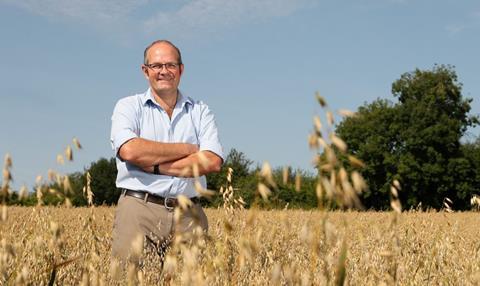The National Farmer' Union (NFU) has responded to an Agriculture and Horticulture Development Board (AHDB) survey linking reductions in yield of crops, which are used to feed livestock, to wet weather in the UK.

The NFU urged Government to commit to an agricultural budget in order to ensure that British farming could "meet the challenges" of climate change. This comes as a response to the declining crop yields, which could mean farmers may need to import feed for livestock.
Crops seeing yield declines include:
- Wheat - down 15% at 1.463 million hectares (biggest reduction in cropped areas since 2020)
- Oilseed rape – down 28% at 280,000 hectares (biggest reduction since 1980s)
- Winter barley – down 22% at 355,000 hectares (biggest reduction since 2020)
NFU president Tom Bradshaw commented on the survey results, saying: "Since the end of last year, farms across the country have faced continued wet weather with many thousands of acres of productive farmland affected.
"Not surprisingly, results from this AHDB survey paint a bleak picture and build on an unprecedented year in terms of high input costs, lower commodity prices and a reduction in direct payments.
“It is another example of how vulnerable British food producing businesses are and highlights the possibility of more crops being imported, potentially produced to standards that would be illegal here, all adding further to market volatility. That’s why domestic food production must be given the right policy framework and the priority it deserves.
"Our manifesto urges the next Government to commit to an agricultural budget that ensures British farming can meet the challenges of climate change and deliver on the Government’s own statutory commitments for the environment and net zero, while producing sustainable British food.”
David Eudall, AHDB economics and analysis director, said: "We may see wheat production fall... so wheat processors, flour millers and bakers will be looking to import greater quantities of wheat this season for production into bread and animal feed.
"A greater reliance on imports means that as global prices rise due to weather or geopolitics, UK food producers using wheat would need to pay a higher price to attract wheat into the country rather than having access to a locally available supply.
"So while current market conditions are favourable to consumers, they are not supporting farmers who are facing lower incomes and higher costs."
The survey also outlined that a potential reduction in straw could impact the wider agricultural sector.
This story was originally published on a previous version of the Meat Management website and so there may be some missing images and formatting issues.















